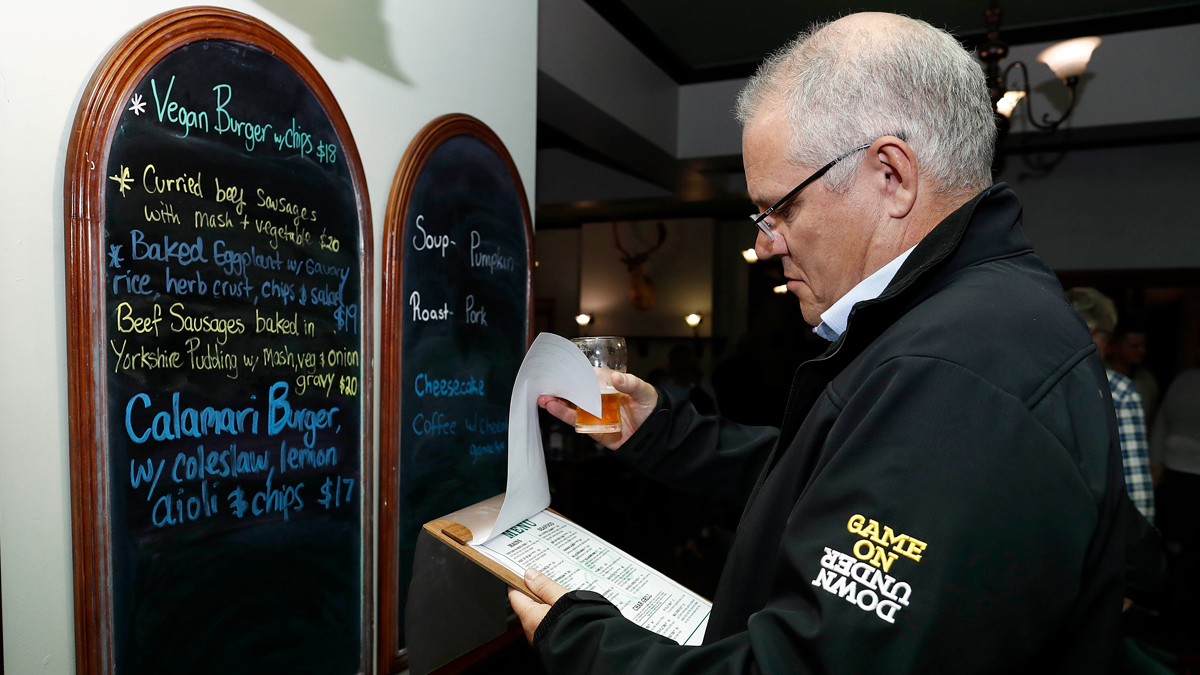THINK TANK: ScoMo has the tools for a ‘decade-long boom’ in his hand if he gets this budget right

Budget ScoMo crunches the numbers. Hard to go past the curried mystery bags. Picture Getty Images
- Australia could break away from a decade of stagnation if it focuses on genuine reform, according to think tank The Blueprint Institute.
- Despite having a number of former Liberal MPs on its ‘strategic council’, the Institute advises the Morrison government to forget immediate budget repair, and instead prioritise economic growth.
- Among its proposals are universal childcare, a green energy transition, tax reform, and a big investment in the arts and innovation sectors.
The Morrison government could set up Australia for a decade-long boom if it can see past the short-term constraints of politics. Miss the opportunity, though, and the country could suffer another lost decade.
These are the stakes of the next federal budget, due to be handed down next Tuesday, according to The Blueprint Institute, an Australian think tank.
While Australia may look like it’s heading for recovery and a smooth return to normal, it can do better, according to chief economist Steven Hamilton.
“Normal isn’t good enough. Our economy was barely growing as the crisis struck. Investment, productivity, and wages were all stagnant. The decade we have is up to us,” Hamilton said. “Just as the last Roaring Twenties – in the shadow of World War I and the Spanish Flu pandemic – was an era of rapid economic and cultural change, these twenties can be roaring too.”
Notwithstanding how that decade of excess and exuberance produced large asset bubbles and ultimately brought on the Great Depression, the prospect of kickstarting serious economic growth is an alluring one.
If it has the ambition, there are four key areas the Morrison government should focus on, Hamilton and the Blueprint Institute propose.
1. Safety, innovation and creativity
The first is make a serious investment in Australian innovation. In order to “spark the next boom”, Australia should become an Asia-Pacific hub for vaccine production to see off this and future pandemics and establish a research centre for sudden catastrophes.
With the security that would provide, Australia could then focus on growing the arts via a $3 billion endowment managed by the Future Fund, as well as accelerating local innovation via a drastically expanded research and development (R&D) incentive program.
2. Tax cuts and unemployment insurance
Blueprint, which is counselled by a number of former Liberal MPs including Christopher Pyne and Bruce Baird, advises against a return to the Coalition’s tried and true line of ‘fiscal responsibility’. Instead of rushing to pay back deficits via taxes and cuts to services, Hamilton and co. suggests a rapidly expanding economy will in turn take care of budget repair.
To fuel the economy, the Institute is lobbying for a $3,000 flat deduction for taxpayers, putting hundreds of dollars back into the pockets of Australians as a result.
This, it argues, would help end the tax offset for low and middle income earners rather than extend it. Hailing back to more traditional LNP policies, a proposed restructure of Australia’s tax brackets would deliver a tax cut to higher income earners instead, with the Institute also advocating for reduction of the corporate tax rate – despite the fact other jurisdictions like the United States are raising it.
On the employment front, Hamilton and his team argue the government needs to increase the payments made by its controversial JobMaker scheme by 50%, and ditch the age criteria for recipients. It would also have the government pay ‘unemployment insurance’, a six-month additional payment of 70% a person’s wage when they lose their job.
3. ScoMo budget must consider green transition
After more than a decade’s inertia on carbon policies, Australia runs the risk of being left isolated on climate change. To overhaul the country’s position, the Blueprint Institute says we need to plan a phase down of coal, triple green R&D spending, invest in electric vehicle (EV) charging stations, and plan the economic transformation of regional economies dependent on fossil fuels.
To meet carbon targets, Australia could invest more heavily in the emissions reduction fund (ERF), what Hamilton claims is the “highest-value emissions reduction option we currently have”.
Under the scheme, organisations can earn credits by voluntarily reducing their carbon footprint. This can then be on-sold to others eager to offset their own footprint.
4. Children are the future
With a view to nature the next generation, childcare makes up the fourth tenet of the would-be budget. Introducing a default, free pre-kindergarten from three years of age would “level the playing field for all children”.
Parents with children under three would meanwhile be eligible for a “streamlined” and means-tested single payment to support their childcare payments. Childcare generally would become tax-deductible.
While it’s unclear what the Morrison government may announce next week, there is plenty of speculation that childcare could form some of its biggest policy reveals ahead of a possible election.
A successful federal budget with a long term vision wouldn’t hurt either.
This article first appeared on Business Insider Australia, Australia’s most popular business news website. Read the original article. Follow Business Insider on Facebook or Twitter.
UNLOCK INSIGHTS
Discover the untold stories of emerging ASX stocks.
Daily news and expert analysis, it's free to subscribe.
By proceeding, you confirm you understand that we handle personal information in accordance with our Privacy Policy.








